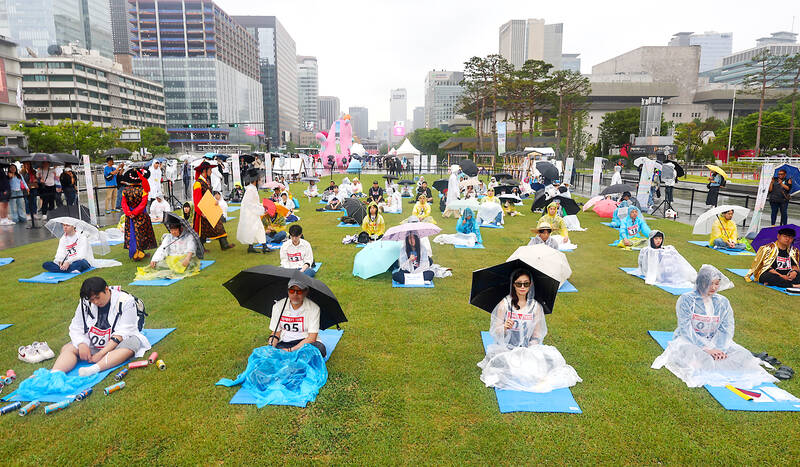In downtown Seoul, in front of the iconic Gyeongbokgung palace, dozens of people of all ages sit on wet yoga mats, staring into space. Some are dressed in doctors’ and dentists’ uniforms, while others wear the attire of office workers and students. Welcome to the international “space-out competition”.
The rules are simple: do absolutely nothing. Falling asleep, however, leads to disqualification. Organizers monitor the participants’ heart rates; the contestant with the most stable heart rate wins.
Started in 2014 by local artist Woopsyang, the space-out competition has grown in popularity over the years. Described as visual art, the performance aims to create a mini-city of people doing nothing amid those busy at work, driving home the message that doing nothing is not a waste of time.

Photo: EPA-EFE
South Korea is known for its punishing work culture, with some of the longest hours in the developed world. Despite the introduction of the 52-hour weekly work limit in 2018, overwork and exhaustion are still not uncommon. The government last year proposed to increase the maximum weekly working time to 69 hours, sparking a severe backlash and eventual backdown.
Students too face high levels of stress, living with the so-called “education fever,” characterized by long hours of study and the attending of private academies in the hope of attending a prestigious university and getting a job at one of the country’s top companies.
A 2022 government survey targeting 19-34-year-olds found that one in three young people had experienced burnout in the past year, with reasons cited including career anxiety at 37.6 percent, work overload at 21.1 percent, skepticism about work at 14.0 percent, and work-life imbalance at 12.4 percent.
Against this backdrop, Sunday’s event was a chance to take a break from it all. The competition has previously been held in cities such as Tokyo, Taipei, Beijing and Rotterdam. Participants this year came from home and abroad, including France, Nepal, South Africa, Vietnam, and Malaysia.
The rain did little to deter the participants, most of whom used umbrellas and disposable ponchos. Some lay flat on the ground, gazing at the sky, while others assumed meditative positions. Several wore traditional Korean attire, including a ‘gat’ hat, a symbol of high society during the pre-industrial era, when leisure time was often associated with the nobility and literati.
“In a way, this makes conditions ideal to space out,” the host remarked.
First-place winner Valentina Vilches, originally from Chile but residing in South Korea and working as a psychology consultant, said she came to have fun but also wanted to share her experience with her patients.
“I want to remind them about the importance of spacing out and relaxing and how this positively affects your mental health,” she said after receiving her golden trophy in a shape inspired by Rodin’s The Thinker and the Pensive Bodhisattva, a South Korean national treasure.
Kim Ki-kyung, a South Korean office worker who was nearly late to the event after being made to work on Sunday morning, said it was a small opportunity to take a breather.
“Korean society is very competitive, so sometimes doing nothing is essential,” he said.
“I think we’ve forgotten how to do that.”

On April 26, The Lancet published a letter from two doctors at Taichung-based China Medical University Hospital (CMUH) warning that “Taiwan’s Health Care System is on the Brink of Collapse.” The authors said that “Years of policy inaction and mismanagement of resources have led to the National Health Insurance system operating under unsustainable conditions.” The pushback was immediate. Errors in the paper were quickly identified and publicized, to discredit the authors (the hospital apologized). CNA reported that CMUH said the letter described Taiwan in 2021 as having 62 nurses per 10,000 people, when the correct number was 78 nurses per 10,000

As we live longer, our risk of cognitive impairment is increasing. How can we delay the onset of symptoms? Do we have to give up every indulgence or can small changes make a difference? We asked neurologists for tips on how to keep our brains healthy for life. TAKE CARE OF YOUR HEALTH “All of the sensible things that apply to bodily health apply to brain health,” says Suzanne O’Sullivan, a consultant in neurology at the National Hospital for Neurology and Neurosurgery in London, and the author of The Age of Diagnosis. “When you’re 20, you can get away with absolute

May 5 to May 11 What started out as friction between Taiwanese students at Taichung First High School and a Japanese head cook escalated dramatically over the first two weeks of May 1927. It began on April 30 when the cook’s wife knew that lotus starch used in that night’s dinner had rat feces in it, but failed to inform staff until the meal was already prepared. The students believed that her silence was intentional, and filed a complaint. The school’s Japanese administrators sided with the cook’s family, dismissing the students as troublemakers and clamping down on their freedoms — with

As Donald Trump’s executive order in March led to the shuttering of Voice of America (VOA) — the global broadcaster whose roots date back to the fight against Nazi propaganda — he quickly attracted support from figures not used to aligning themselves with any US administration. Trump had ordered the US Agency for Global Media, the federal agency that funds VOA and other groups promoting independent journalism overseas, to be “eliminated to the maximum extent consistent with applicable law.” The decision suddenly halted programming in 49 languages to more than 425 million people. In Moscow, Margarita Simonyan, the hardline editor-in-chief of the